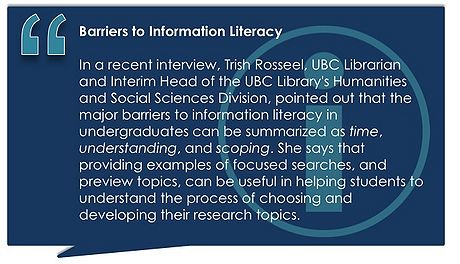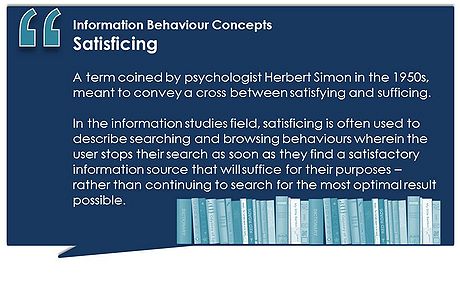Library:Faculty Information Literacy Toolkit/Scoping
Scoping
In the spring of 2013, learning and assessment librarians from the UBC Library met with groups of first year students to ask them about their experience and understanding of research as their first term of studies drew to a close. The conversations between the students and librarians revealed quite a lot about how students approach research at the beginning of their academic careers.
There are five fundamental elements to the research skills students need to learn in order to succeed in first year and beyond. This video introduces the element of "scoping" the information need.
Scoping is the activity students engage in when they select or narrow their topic by asking questions, by taking a stance on the issue at hand, and/or by identifying and selecting stances to explore. This may occur simultaneously with the Finding and Evaluating elements, as students explore the available information and refine their research question(s).
Tips to Address Scoping

Connecting the Research Topic(s) to Course Content
Creating research assignments that connect to course content is at the root of developing clear assignments. However, anchoring the assignments to key terms, ideas, and elements of the subject discourse that have been covered in the class so far will provide students with a starting point for selecting a topic that is both reflective of the course work and provides a basis to begin searching for additional resources.
Examples of these kinds of starting points include topic keywords/terms; major ideas covered in class; authors covered in class.
Supportive Topic Exploration
The concern that scoping too early and too narrowly can limit the student's creativity and learning experience is a valid one.
However, examinations of the first year research experience, including those performed here at UBC, also reveal that assigning broad topics can leave students feeling lost, frustrated, and discourage them from investing time and effort in the project at hand.
If you do want your students to begin from a broad topic and refine it on their own, consider supporting and scaffolding the development of these scoping and refining skills by providing in-class opportunities for students to practice processes such as:
- "The art of browsing books:
- How can you use the catalog to find an appropriate section of the library for browsing? How do you choose which texts to look at? How do you evaluate a book through its table of contents and index? How do you skim chapters?
- The art of browsing scholarly articles:
- What are the general organizational structures of scholarly articles in the field? Where might they find a section on the review of the literature? What indicators do scholars use to highlight their own position? Where might scholars consider counterarguments, and how are those indicated?
- The art of following bibliographic trails:
- How might students identify the scholarship associated with a particular line of arguments in a text?
- The art of using databases to decode disciplinary approaches:
- How to enter key terms into a range of disciplinary databases to see what kinds of articles show up and how-to decode the results so as to see the different disciplinary arguments about an issue?
- The art of keyword analysis:
- Critically analyzing the ways that databases and disciplines use key terms." - Nutefall, J. E., & Ryder, P. M. (2010). The Serendipitous Research Process. The Journal of Academic Librarianship, 36(3), 228–234.

Topic Refinement
Supporting the development of scoping skills can also mean encouraging students to select a manageable topic early on in the process. This provides them with more time and focus and creates a higher chance that they will invest in the assignment.
- Provide examples of how to scope a broad topic into a question that is researchable.
- Emphasize the importance of taking a stance, asking a question, or exploring two sides of an issue.
- Provide students with examples of internet, library and database searches used to find appropriate articles.